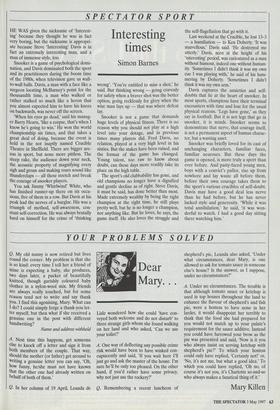SPECTATOR SPORT
Interesting times
Simon Barnes
HE WAS given the nicknanie of 'Interest- ing' because they thought he was in fact very boring, but the nickname is appropri- ate because Steve 'Interesting' Davis is in fact an extremely interesting man, and a man of immense style, too.
Snooker is a game of psychological domi- nation, and Davis dominated both the sport and its practitioners during the boom time of the 1980s, when television gave us wall- to-wall balls. Davis, a man with a face like a surgeon locating McBumey's point for the thousandth time, a man who walked or rather stalked so much like a heron that you almost expected him to have his knees on backwards, was never off the screen.
`When his eyes go dead,' said his manag- er Barry Hearn, 'like a corpse, that's when I know he's going to win.' He won the world championship six times, and that takes a great deal of doing, because the event is held in the not inaptly named Crucible Theatre in Sheffield. There are bigger are- nas in sport, but none more pitiless. The steep rake, the audience down your neck, the acoustic property of magnifying every sigh and groan and making roars sound like thunderclaps — all these stretch and break the courage of snooker players.
You ask Jimmy 'Whirlwind' White, who has finished runner-up there on six occa- sions, five of them in a row. But Davis at his peak had the nerves of a burglar. His was a triumph of method, self-awareness, con- stant self-correction. He was always brutally hard on himself for the crime of 'thinking wrong'. 'You're entitled to miss a shot,' he said. But thinking wrong — going cravenly for safety when a braver shot was the better option, going recklessly for glory when the wise man lays up — that was where defeat lay.
Snooker is not a game that demands huge levels of physical fitness. There is no reason why you should not play at a high level into your dotage, and in previous times many players did. Fred Davis, no relation, played at a very high level in his sixties. But the stakes have been raised, and the format of the game has changed. Young talent, too raw to know about doubt, can these days more readily take its place on the high table. The sport's old clubbability has gone, and old champions no longer have a dignified and gentle decline as of right. Steve Davis, it must be said, has done better than most. Made extremely wealthy by being the right champion at the right time, he still plays pretty well, but he is no longer a champion, nor anything like. But he loves, he says, the game itself. He also loves the struggle and the self-flagellation that go with it.
Last weekend at the Crucible, he lost 13-3 — a humiliation — to Ken Doherty. 'It was marvellous,' Davis said. 'He destroyed me utterly.' Davis, seen at the height of his `interesting' period, was caricatured as a man without humour, indeed one without human- ity. 'Sometimes I didn't think it was my own cue I was playing with,' he said of his ham- mering by Doherty. 'Sometimes I didn't think it was my own arm.'
Davis captures the anxieties and self- doubts that lie at the heart of snooker. In most sports, champions have their terminal encounters with time and lose for the usual physical reasons. 'Legs have gone,' as they say in football. But it is not legs that go in snooker, it is minds. Snooker seems to demonstrate that nerve, that courage itself, is not a permanent aspect of human charac- ter, but a wasting asset.
Snooker was briefly loved for its cast of unchanging characters, familiar faces, familiar neuroses. But these days the game is opened, is more truly a sport than ever before. And pasty-faced young men, boys with a convict's pallor, rise up from nowhere and lay waste all before them, before their own courage takes them to the sport's various crucibles of self-doubt. Davis may have a good deal less nerve than he had before, but he has never lacked style and generosity. 'While it was total annihilation,' he said, 'it was won- derful to watch. I had a good day sitting there watching him.'


































































 Previous page
Previous page